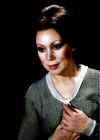ORFEO International – Reviews
Important Releases Briefly Introduced
June 2010
ORFEO 2 CD C 806 102 I
Mirella Freni
Mirella Freni, 
Mirella Freni
Foto: Foto Fayerwho celebrated her 75th birthday a few weeks ago, is one of the utterly exceptional singers who have emerged from Italy, the home of opera. And unlike those other exceptional talents who crop up every few years (and who, despite their qualities, often disappear again just as quickly), Mirella Freni’s standing is merely heightened by the exceptional length of her career, which was so rich in peaks and free of troughs. That success finds confirmation in the selection of archive recordings on the present CD, chosen from the more than three decades during which Mirella Freni sang at the Vienna State Opera. She began with a sensational debut as Mimì in Puccini’s La Bohème. Within the space of half a year, her Mimì won the public’s heart at both La Scala Milan and in Vienna, each time under Herbert von Karajan. Her Rodolfo at the time was Gianni Raimondi, though the Viennese archives also document her longstanding partnerships with Luciano Pavarotti (under Carlos Kleiber) and Plácido Domingo. It was also with Domingo (under the baton of James Levine) that Mirella Freni repeated at the Vienna State Opera her Salzburg Festival success as Desdemona in Otello. 
C 806 102 IAs with her Mimì, her Elisabetta in Verdi’s Don Carlo under Claudio Abbado in 1989 was astonishing, for her voice had lost none of its freshness in the ten years since singing the role under Karajan. In that same decade, she was thus also able to portray with conviction the youthful roles of Amelia in Verdi’s Simon Boccanegra and of Puccini’s Manon Lescaut. Once again at Pavarotti’s side, this time for a Verdi concert in 1990, her public was inspired by her excerpts from Aïda – an unusual role for her. And at this time she also proved with two Tchaikovsky roles that she was more than just a diva in her mother tongue alone. Neither her Tatyana in Eugene Onegin nor her Lisa in Pique Dame (both under the baton of Seiji Ozawa) can be left out of this “Vienna portrait” of her. Nor can her last role at the Vienna State Opera: in singing the title role of Giordano’s Fedora, she joined the ranks of those singers willing to ensure that operatic rarities may return to grace the stage now and then.
top |